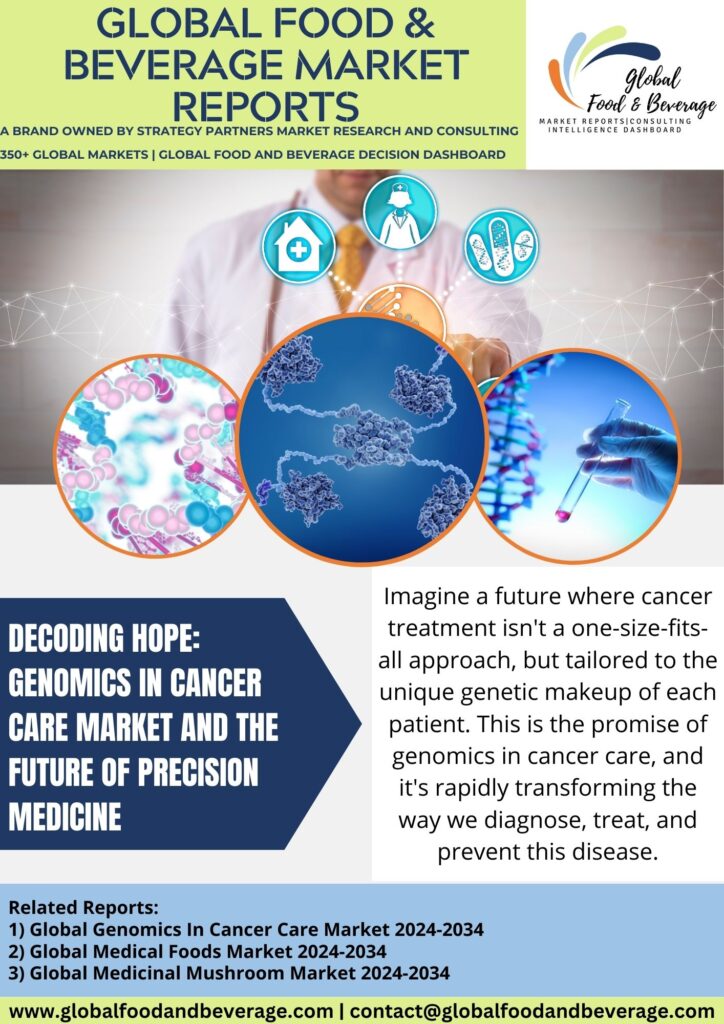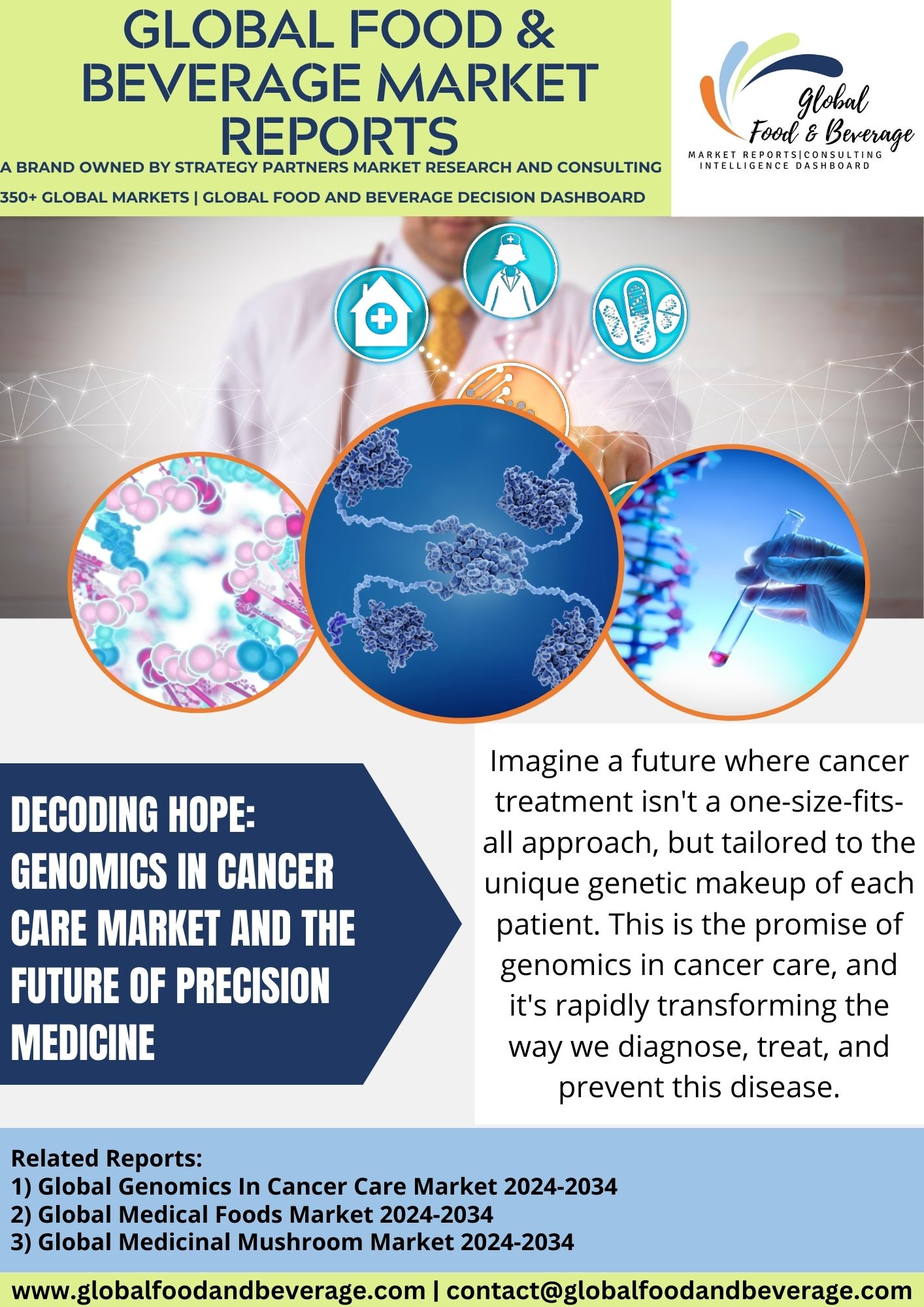Genomics has revolutionized cancer care by offering unprecedented insights into the genetic underpinnings of cancer, paving the way for more personalized and targeted treatment strategies. Genomics, the study of an individual’s complete set of DNA, allows researchers and clinicians to analyze the genetic mutations and alterations within a patient’s tumor, providing a comprehensive understanding of the molecular drivers of cancer.

In cancer care, genomics plays a pivotal role in the era of precision medicine. By examining the unique genetic makeup of a tumor, oncologists can identify specific mutations that drive cancer growth. This information enables the development of targeted therapies designed to inhibit the activity of these specific mutations, leading to more effective and tailored treatment approaches.
One of the significant applications of genomics in cancer care is the identification of biomarkers. These molecular indicators help classify tumors into subtypes based on their genetic characteristics. This classification allows oncologists to predict how a specific tumor is likely to behave and respond to various treatments. For example, the presence of certain genetic mutations may indicate responsiveness to targeted therapies, while the absence of these mutations may guide the choice of alternative treatments.
Genomic testing has become an integral part of diagnosing and managing cancer. Liquid biopsy, a non-invasive technique that analyzes circulating tumor DNA in the blood, has emerged as a valuable tool for monitoring disease progression and detecting genetic changes over time. This approach provides a real-time assessment of tumor dynamics, allowing for timely adjustments to treatment plans based on evolving genomic profiles.
Furthermore, genomics contributes to cancer research by facilitating the discovery of new therapeutic targets and the development of novel drugs. Clinical trials increasingly incorporate genomic profiling to identify patient populations that are most likely to benefit from experimental treatments. This targeted approach not only enhances the success rates of clinical trials but also expedites the translation of research findings into clinically meaningful advancements.
Despite the transformative impact of genomics in cancer care, challenges remain, including the interpretation of complex genomic data, ethical considerations, and the integration of these technologies into routine clinical practice. However, ongoing advancements in technology, data analysis, and collaborative research efforts continue to propel genomics forward, shaping the future of cancer care towards more precise, individualized, and effective treatment strategies.
ADVANCEMENTS
Genomics has brought about groundbreaking advancements in cancer care, transforming the way we understand, diagnose, and treat various forms of cancer. One significant breakthrough is the use of genomic profiling to characterize the genetic alterations driving cancer development. Next-generation sequencing technologies enable comprehensive analysis of a patient’s tumor DNA, identifying specific mutations, gene expressions, and genomic signatures. This information plays a crucial role in developing personalized treatment plans tailored to the unique genetic makeup of each patient’s cancer.
Advancements in genomics have facilitated the discovery of cancer biomarkers that guide targeted therapies. Identification of specific genetic mutations allows for the development of targeted drugs designed to inhibit the activity of mutated proteins driving cancer growth. This approach minimizes the side effects associated with traditional chemotherapy and increases the effectiveness of treatment.
Liquid biopsy, another genomic innovation, has emerged as a less invasive method for monitoring cancer progression and treatment response. Analyzing circulating tumor DNA (ctDNA) in blood samples provides real-time information on genetic changes in tumors, enabling clinicians to adapt treatment strategies based on evolving genomic profiles.
Immunogenomics is an evolving field that explores the interplay between the immune system and cancer genomics. Understanding how tumors evade the immune response has led to the development of immunotherapies, which harness the body’s immune system to target and eliminate cancer cells. Genomic profiling helps identify patients who are most likely to benefit from immunotherapies.
Furthermore, genomics plays a pivotal role in cancer risk assessment and prevention. Individuals with a familial predisposition to certain cancers can undergo genetic testing to assess their risk, allowing for proactive measures such as increased surveillance or preventive interventions.
CHALLENGES
Genomics in cancer care presents several challenges related to the complexity of genetic information, data interpretation, ethical considerations, and integration into routine clinical practice. One significant challenge is the vast amount of genomic data generated from cancer patients. Analyzing and interpreting this wealth of information, including identifying relevant mutations and understanding their clinical significance, requires sophisticated bioinformatics tools and expertise. The need for robust data management and analysis infrastructure is crucial for extracting meaningful insights from genomic data.
Clinical implementation and integration of genomics into cancer care pose substantial challenges. Oncologists and healthcare providers need specialized training to interpret genomic information and make informed treatment decisions. Additionally, integrating genomic data into electronic health records and ensuring seamless communication among healthcare professionals is essential for providing comprehensive and coordinated cancer care.
Ethical considerations in genomics present challenges related to patient privacy, consent, and the responsible use of genetic information. Safeguarding patient data from unauthorized access, ensuring informed consent for genomic testing, and addressing concerns about genetic discrimination demand careful attention and the establishment of ethical frameworks in genomic cancer care.
Access to genomic testing and therapies is a significant challenge, particularly in underserved populations. Disparities in healthcare resources and access to cutting-edge genomic technologies can exacerbate existing health inequalities. Efforts to democratize access to genomic testing and therapies are essential to ensure that all patients, regardless of socioeconomic status, can benefit from advancements in cancer genomics.
The dynamic nature of cancer genomes and the emergence of resistance mechanisms present ongoing challenges. Tumor evolution and the development of resistance to targeted therapies underscore the need for continuous monitoring of genomic changes and the development of adaptive treatment strategies.
CONCLUSION
Genomics in cancer care represents a transformative leap towards personalized and precise medicine. By decoding the intricate genetic landscape of tumors, this cutting-edge approach tailors treatment strategies to individual patients, maximizing efficacy and minimizing side effects. The era of genomics heralds a new chapter in cancer care, where targeted therapies and early detection significantly improve outcomes. Despite challenges, ongoing research and technological advancements promise continued progress. As genomics becomes an integral tool in oncology, its potential to redefine treatment paradigms offers hope for a future where each cancer patient receives tailored, effective care, marking a pivotal shift in the global fight against cancer.
